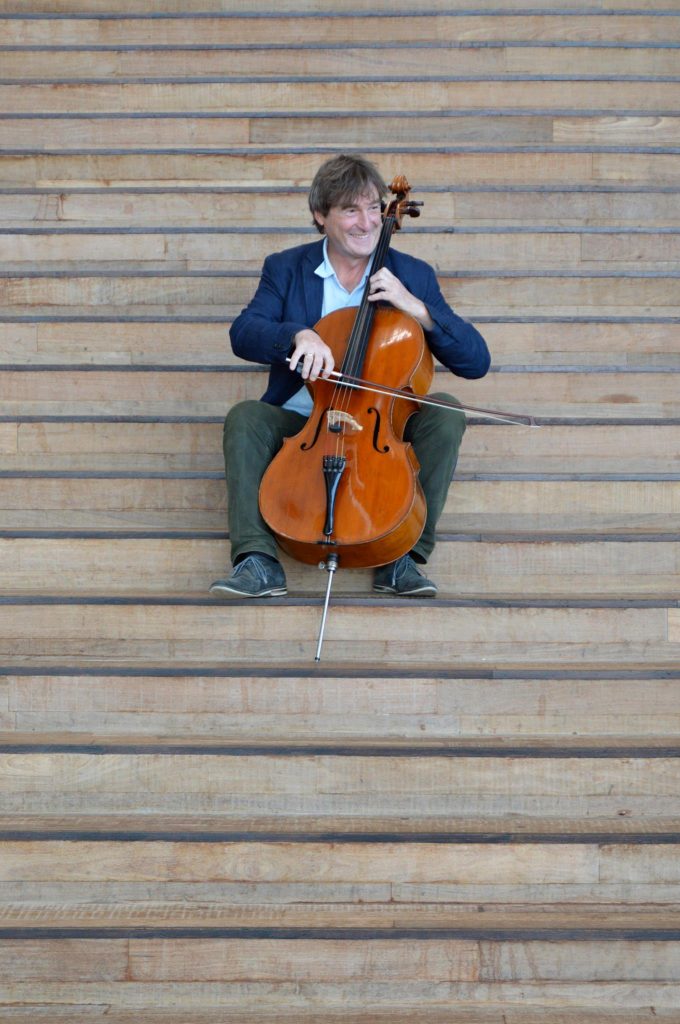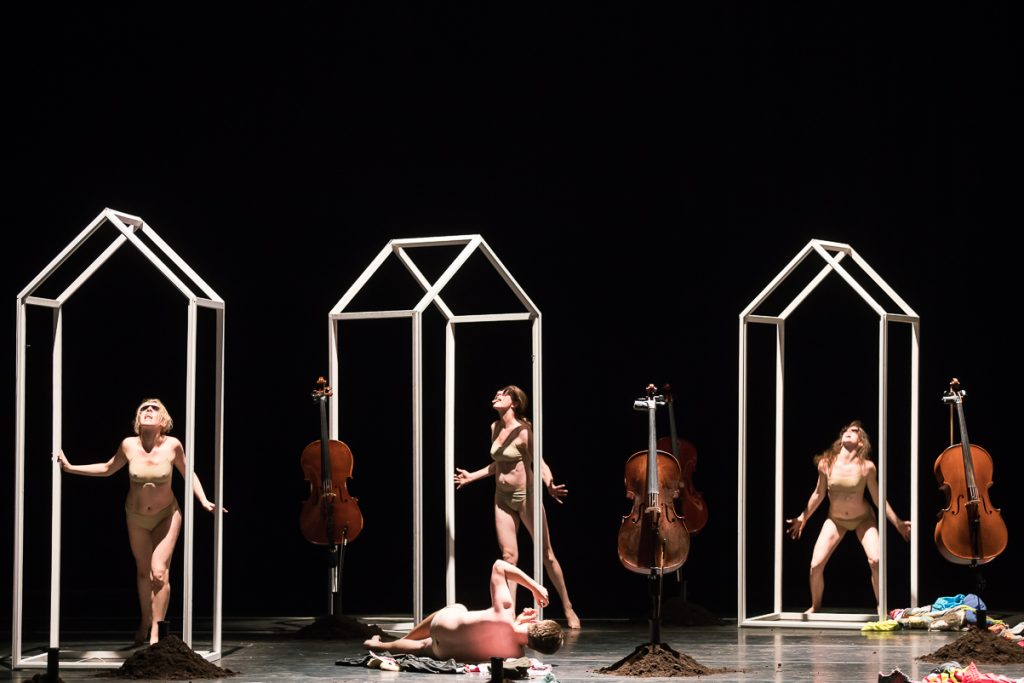The Cello Biënnal Amsterdam, the world's largest cello festival taking place from 20 to 29 October at Amsterdam's Muziekgebouw aan 't IJ, has begun and it is already taking a battering. For ten days, 27 international cello soloists, 6 orchestras, 11 ensembles, 1 choir and many musicians from 26 countries will give over 800 performances. From early morning -Bach & Breakfest- until late at night -Late Cello Night at the Bimhuis- there are concerts, performances, master classes and workshops. The latest music will be heard alongside beloved classics, flamenco, jazz, pop and world music. 12 young cellists compete in the National Cello Competition and 160 children play in the Hello Cello Orchestra.
There was already a mini-festival Cello & Film in September at Eye. Four writers - Jan Brokken, Marente de Moor, Ilya Pfeiffer and Annelies Verbeke - commissioned by the Cello Biënnal stories about the cello, collected in Four Variations for cello. Cello builders, bow makers and music publishers populate the hall of the Muziekgebouw aan 't IJ. This has turned into a musical meeting place, buzzing with cellists, amateurs and music lovers. Many concerts and performances are sold out in advance.
Sexy
What explains the magical appeal of the cello, perhaps the most disarming among string instruments?
[Tweet "'Cellists clamp the instrument between their legs and that looks very sexy on women.'"]
Founder, artistic director and cellist Maarten Mostert: 'Cello is the instrument that comes closest to the timbre of the human voice with its warm tone. The cello has the contours of a woman's body. Cellists clasp the instrument between their legs, which looks very sexy on women, while male cellists seem to embrace their lover while playing. In my opinion, cellists are also the most relaxed musicians among string players. But whether any of this is the success of the cello and Cello Biënnal can explain, I don't know. I want to have research done on it one day. I wouldn't be surprised if the sound of the cello releases a substance in our heads that makes people feel happy.'
Common thread of the sixth edition of the original and multi-faceted programmed Cello Biënnal forms The Acting Cello. That was reason to kick off on Thursday with a pre-opening concert in two episodes on ONEan evening. Maarten Mostert likes to do things on a grand scale.
Wolf mask
The opening performance Instant Happiness by theatre-maker Dagmar Slagmolen was performed by the Cello8ctet Amsterdam to music by Flemish theatre composer Jan Kuijken.
It is about greed and the disastrous effect that disposable fashions - often manufactured under degrading conditions - from Asiaë on us. In the raw, textless musical theatre performance, the cellists are also actors and the cello is not only a musical instrument but also a theatrical attribute.

Clad in shabby underwear, the cellists of the Cello8ctet represent shadowy figures from a society symbolised by eight skeletonised houses. From the sky, golden bags of clothing fall down to Kuijken's minimal music-like cello sounds. Thus begins the great snatching, in which the players sometimes also use their cello as a weapon and rob each other. Until saturation has set in and all those cheap clothes turn out not to be so happy after all.
The cellists pull out all the skin-irritating crap again and wriggle neurotically from itching over the greed-scorched earth. Eén girl takes a different approach and knits to melancholic melodyën in the style of Shostkowich her own responsible jumper. She is overtaken by the wolf army of greed and, like the other players, is given a wolf mask herself. 'What happens when all the gold is looted from heaven?', Slagmolen wonders. 'What happens then to that need that generates so much energy?' For now, the performance ends with jaded creatures, lying down to produce dying sounds on their cello.
Noise on Opening Concert
On the opening day, eight young cellists fought for admission to the Second Round of the National Cello Competition, for which 12 participants applied, in front of an auditorium full of over-50s and a jury composed mainly of cellists. Selection was based on performances of Boccherini's Sonata in B-flat, G. 565 and the obligatory new solo work Air, commissioned by the Cello Biënnale written by Rob Zuidam. This makes extreme demands, as Zuidam has left no passage unused to get the utmost out of the cello, while Boccherini's notoriously virtuoso cello music is not every cellist's natural fit.
Among the participants, Alexander Warenberg and Anastasia Feruleva particularly drew attention with their impressive instrumental mastery and extraordinary musicality. Melle de Vries also bravely held his own, but was still a bit pale in comparison to Warenberg's remarkable professionalism and Feruleva's musical personality.
Empty words
In the evening, after an incendiary musical 'preview' by swinging duo BartolomeyBittman, minister Bussemaker opened the Cello Biënnal officiëel, with lovely empty words about 'musical innovation' and 'rediscovering the cello'. Then the four cellists of the Biënnal Cello Band - Larissa Groeneveld, Jelena Očić, Timora Rosler and Jeroen den Herder-at the real Opening Concert scratching and squeaking on their strings modern city sounds like popping firecrackers set off against a serene white background. Hidden behind them were percussionists from Slagwerk Den Haag and several horns and double basses from the Netherlands Philharmonic. Led by Ed Spanjaard, they gradually blended into the heated cello explosions of humorous noise without form, structure or meaning, as innovatively chronicled in the score by Composer of the Netherlands Mayke Nas, whose Unraveled made its world premiere.
The older members of the audience grumbled a bit in the process, shaking their heads. They could then content themselves with the old-fashioned integer performance of Bloch's Schelomo, brilliantly played by Brazilian master cellist Antonio Meneses. He managed to couple a distinguished-singing modesty with a deeply felt emotionality. Meneses, who approached Bloch's piece with a chamber-music-like clarity, was accompanied by Spanjaard and the Netherlands Philharmonic Orchestra with empathy and enthusiasm. However, the Great Hall of the Muziekgebouw aan 't IJ proved acoustically incapable of accommodating such a large orchestral work, so Bloch degenerated into 'conducted noise' more than necessary. As a result, Meneses' subtle cello playing lost its expressiveness unnecessarily.
Blamage
The subsequent performance of Lalo's Cello concerto in d by cellist Pieter Wispelwey ran into trouble due to a lack of resonance space. The musical blows the orchestra delivers in this work to inspire and fire up the soloist now turned out like deafening thuds. As a result, Pieter Wispelwey - already not strong in those intensely romantic, shimmering melody lines that Lalo's music needs to blossom - sought refuge in vain in an almost laughable facial expression to reinforce his musical intentions. All in all, the sounding result was an archetypal Dutch blamelessness for the cello and Lalo. After all, the latter requires a passionate solo cellist who naturally senses how to challenge and seduce the score as an elegant and controlled musical toreador in order to touch the hearts of his audience.
The benevolent audience enjoyed it just as much and made their way to the Cello Lounge in large numbers after the performance to enjoy a nice drink. chill, followed by an overnight visit to the Bimhuis, where the duo BartlomeyBittman went crazy during a night concert, by way of tasteful prelude to all the exciting and beautiful things to come...
